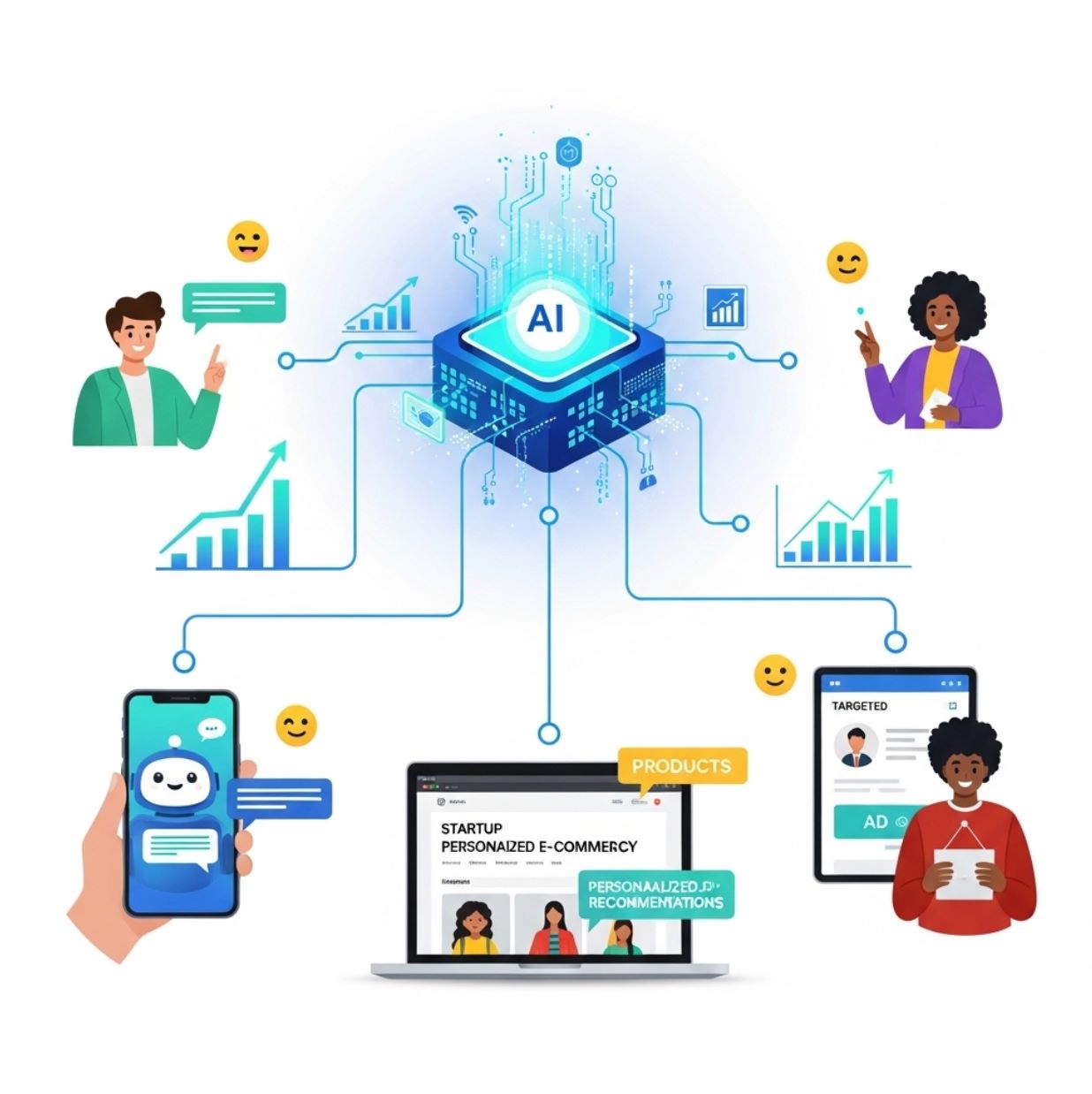Why Startups Should Adopt AI?
In the digital age, AI (artificial intelligence) is no longer a distant technology but has become a strategic tool to help businesses optimize processes, reduce costs and create competitive advantages. Especially for startups, applying AI right from the start-up stage brings opportunities for outstanding growth, from analyzing customer data, forecasting market trends to personalizing user experiences. This article will analyze why startups should apply AI to break through and develop sustainably in the 4.0 era.
AI is no longer a futuristic gimmick – it's a game-changer for startups. By automating tasks and analyzing data, AI helps young companies innovate and scale faster.
Startups – often the first to embrace new tech – tend to bring radical innovations to market when leveraging AI.
— Industry Research
AI tools can streamline operations and decision-making: one survey found that AI has become "a central tool for startups, helping them streamline operations, boost productivity and make smarter decisions" even during tough economic times.
- 1. Key Benefits of AI for Startups
- 2. Efficiency and Productivity Gains
- 3. Data-Driven Decision Making
- 4. Enhanced Customer Experience and Marketing
- 5. Innovation and Competitive Edge
- 6. Attracting Investment and Growth Opportunities
- 7. Broad Industry Applicability
- 8. Overcoming Challenges
- 9. Conclusion: The AI Imperative
Key Benefits of AI for Startups
Streamlined Operations
AI automates repetitive tasks like data entry or customer support, reducing errors and freeing founders to focus on growth.
Smarter Decision-Making
By processing large data sets instantly, AI delivers real-time insights. Marketing AI can show up-to-the-minute campaign performance for confident, data-driven choices.
Enhanced Customer Experience
Chatbots and personalization engines let startups engage customers 24/7.
- 81% of AI-using startups see improved upsell/cross-sell rates
- Higher customer satisfaction scores
Lean Scalability
AI lets startups do more with less. Teams stay nimble: some companies now target $60–100M ARR with well under 150 employees, thanks to AI-driven automation and analytics.
Efficiency and Productivity Gains
Artificial intelligence can turbocharge a startup's productivity. By taking over time‑consuming tasks – from bookkeeping to marketing email generation – AI frees founders to focus on high‑impact work.
Manual Operations
- Time-consuming data entry
- Manual lead qualification
- Human errors in databases
- Limited working hours
Automated Systems
- Automatic database updates
- AI-driven lead scoring
- Eliminated human drudgery
- 24/7 operations
Experts note that AI lets teams work faster and smarter; startups using AI report much higher revenue per employee.
This means less spending on manual labor and more output from every team member. In fact, one study found 83% of AI-adopting founders saw significantly higher returns than with old methods. Overall, AI-driven automation helps startups do more with less – a vital edge when resources are tight.

Data-Driven Decision Making
In a fast-moving market, data is gold – and AI is the best miner. Startups can use AI analytics to sift through customer behavior, sales trends and market signals at machine speed, surfacing patterns humans would miss.
Real-Time Insights
Early Warning System
Quick Pivots
AI-enabled decision-making is faster and smarter because it can deliver the data business leaders need in real time.
— University of Cincinnati Report
Companies using AI access these insights on the fly, then make informed choices with confidence. Around half of businesses already apply AI to multiple functions – from marketing to supply chain – to gain this analytic edge.

Enhanced Customer Experience and Marketing
AI isn't just back-office; it transforms how startups reach and keep customers. Chatbots, personalization engines and recommendation systems make every user interaction smarter.
24/7 Customer Support
An AI chatbot can answer routine questions around the clock, letting customers get instant help while founders sleep.
Personalized Experiences
AI-driven personalization engines analyze user data to recommend products or content tailored to each visitor.
Targeted Marketing
AI can hyper-target ads to individual users based on behavior, lowering acquisition costs.
The payoff is higher engagement and loyalty. In practice, startups see real results: a CMS survey found 81% of AI-forward startups report better upsell and cross-sell rates and more satisfied customers.

Innovation and Competitive Edge
Startups thrive on innovation, and AI is a force-multiplier. Because AI can generate ideas (through generative models) or improve R&D, it can spark radical new products.
Start-ups indeed often bring to the market more radical innovations, especially when new technological paradigms, such as AI, emerge.
— OECD Research
In other words, AI empowers small teams to punch above their weight with breakthroughs that established players haven't dreamed of.
- AI-driven approach signals cutting-edge ambition
- Customers perceive AI-driven startups as forward-thinking
- Partners view AI adoption as innovation leadership
- Market positioning as technology pioneer
In short, adopting AI helps startups stay ahead of the pack and define new market standards.

Attracting Investment and Growth Opportunities
Investors recognize the power of AI. In the current funding climate, VCs often treat AI integration as non-negotiable.
If startups aren't using AI tools or agents, we're less inclined to invest.
— Khosla Ventures
This reflects a broader trend: startups that embrace AI are more likely to impress backers and weather market challenges.
Limited Outlook
Strong Confidence
Survey data confirms this optimism: 93% of startups investing heavily in AI report a positive outlook on their financial future, versus only 71% of non-adopters.
In summary, integrating AI not only drives internal growth but also makes a startup more attractive to investors and partners.

Broad Industry Applicability
AI's benefits aren't limited to tech startups – they apply across every sector. Startups in finance, healthcare, education, retail and more are using AI to get ahead.
Health-Tech
Fintech
E-commerce
EdTech
In fact, surveys show at least half of startups in every industry are reallocating budgets toward AI tools.
AI is a "general-purpose technology" whose full potential spans all fields. AI adoption can boost productivity and reduce errors across diverse industries.
— OECD Experts
Put simply, whether you're in biotech or ecommerce, AI can optimize processes and open new possibilities. Startups can even leapfrog incumbents by applying readily available AI services (like cloud AI APIs) to niche problems.

Overcoming Challenges
It's true that adopting AI comes with hurdles: startups often lack specialized AI talent and must invest time learning new tools.
However, the trend is clear: even companies with limited means recognize the payoff. Many older or better-funded startups are already shifting significant resources to AI.
Start Small
Use affordable AI tools and services
Learn & Adapt
Leverage public programs and partnerships
Scale Up
Grow AI capabilities over time
Public programs and partnerships can help bridge the skills gap, but ultimately the cost of not using AI is often higher. As founders share, running behind on AI can leave you scrambling, whereas early adopters reap long-term gains.

Conclusion: The AI Imperative
In summary, the evidence is overwhelming: AI can supercharge a startup's growth and viability. It streamlines operations, drives data-driven strategies, and enhances customer engagement, all of which let small teams achieve big outcomes.
- AI adoption signals innovation and attracts funding
- Today's most resilient startups report higher confidence after embracing AI
- Faster growth rates compared to non-AI adopters
- Competitive advantage in crowded markets
For any entrepreneur, the question isn't if to adopt AI, but when – and sooner is better to secure a lasting edge in the market.







No comments yet. Be the first to comment!